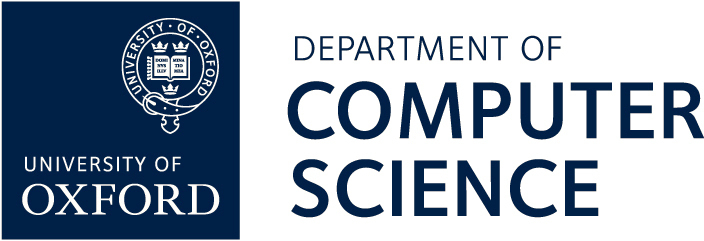
|
|

|
Introduction
The project supports a DPhil studentship that is part-funded by Kleros, who develop online blockchain-based systems for dispute resolution, in which settlements of disputes are crowdsourced from multiple users. This leads to interesting challenges of how to incentivise users to make carefully-considered judgements, and how those judgements should be aggregated. Feb 2025: I am happy to have recruited a student to this position and look forward to starting the work later in 2025. Meanwhile, here is a link to a related workshop I will attend in April 2025.
The student will be supervised by Paul Goldberg and be based in the Algorithms and Complexity Theory research group. The project offers the opportunity for the student to take the lead in a new line of interdisciplinary research, combining Computer Science with Economics. It has an opportunity to develop novel ‘blue-sky’ theory, motivated by practical applications. The main methodology is mathematical analysis, sometimes supported by computational experiment. There are opportunities to interact with related research activity in Oxford’s CS department (notably theoretical CS and AI), at Kleros, and also in the department of Economics, where Prof Goldberg has strong connections. link to web page on DPhil in Computer Science at Oxford, discussing coursework requirements and other detailed aspects.
Administrative details
- The project supports fees plus maintenance for any student who is eligible for home (UK) tuition fees. Link to guidance on fee status and how to evaluate it.
- Dates: to start in 2025 (most likely around the beginning of October 2025), funded for 3½ years in total, full-time study.
- Entry requirements are discussed at the page on DPhil in Computer Science. Roughly, a first-class degree in Mathematics or CS.
- Application deadline: there are 2 rounds of applications, with deadlines in early December 2024 and early March 2025. The detailed deadlines are given on the DPhil in CS web page gives details on entry requirements, documents needed to apply, procedure, etc.
-
Useful links:
Application guide
for applying to graduate degrees at Oxford.
DPhil in
Computer Science at Oxford.
You should apply for DPhil in Computer Science via the standard route, and in the application specify Paul Goldberg as prospective supervisor, and mention the Decentralised Arbitration project. The research proposal can simply refer to the project, but may also express interest in related relevant topics.
Project description
There is some flexibility about the details of the research topic; two possible directions are discussed below (and there may be others).
One starting-point for research is [George 2023] below (by Dr. William George, Kleros Cooperative). The paper studies mechanisms for crowdsourcing judgements of real-world scenarios, in settings where there is a ground truth, or correct answer, to be elicited. The general topic of research is voting schemes, which is a major theme of computational social choice theory. A general principle identified in the paper is that voting for the “right answer” to a question is a Schelling point, a strategy where the participant gets rewarded for being in agreement with other participants. [Lesaege et al] gives an overview of how Kleros aims to apply these ideas.
There is quite a wealth of research problems that could be investigated in this general line, based on models of the ground truth, and what signals are received by the participants. An intriguing concern with this general approach, is that it may be the case that the desire to agree with other participants may be in conflict with the desire to output one’s own best guess as to the right answer. This issue originates in the long-standing concept of a Keynesian beauty contest (KBC), in which participants may base their vote on their own assessment of their peers’ assessment of the (subjective) beauty of the alternatives.
The project would investigate models of how the participants receive signals based on the ground truth, and analysis of where/how the KBC problem arises. The modelling may include, for example, multi-level reasoning amongst the participants about how they predict each other are likely to vote, along with the design of payoff systems, as discussed in [George 2023]. [George 2023] also studies the presence of adversaries in the electorate, and the design of voting mechanisms that are resistant to those. It is likely that there are plenty of research issues in the adversary-free setting, but dealing with adversaries is of course of interest.
- [George 2023] William George. Strategic behaviour and manipulation resistance in Peer-to-Peer, crowdsourced information gathering. Mathematical Social Sciences 124 pp. 1–23 (2023). (link)
- [Lesaege et al] Clément Lesaege, William George, and Federico Ast. Kleros Long Paper v2.0. (link)
An alternative line of work addresses disputes in which the settlement is a numerical value, as opposed to a binary ruling in favour of one side or the other. That arises in the context of lawsuits, claims for damages, or insurance payouts. The two disputants can be thought of as the “maximiser” and the “minimiser”, referring to the amount that the former receives from the latter. In Final-offer arbitration (FOA) each side submits a proposed payment to the arbitrator, who chooses which of those two amounts looks the more reasonable, and that becomes the settlement. FOA incentivises the two disputants to make reasonable proposals. (Link to detailed discussion about why it often works well, and some variations of the basic idea.) It is interesting to model the situation game-theoretically (example), where for example the knowledge the disputants have about the arbitrator consists of probability distributions over the arbitrator’s judgement. The problem becomes more interesting and challenging when there is more than one arbitrator, or if we assume that the arbitrator’s likely judgement is to be learned from a small number of prior observations.